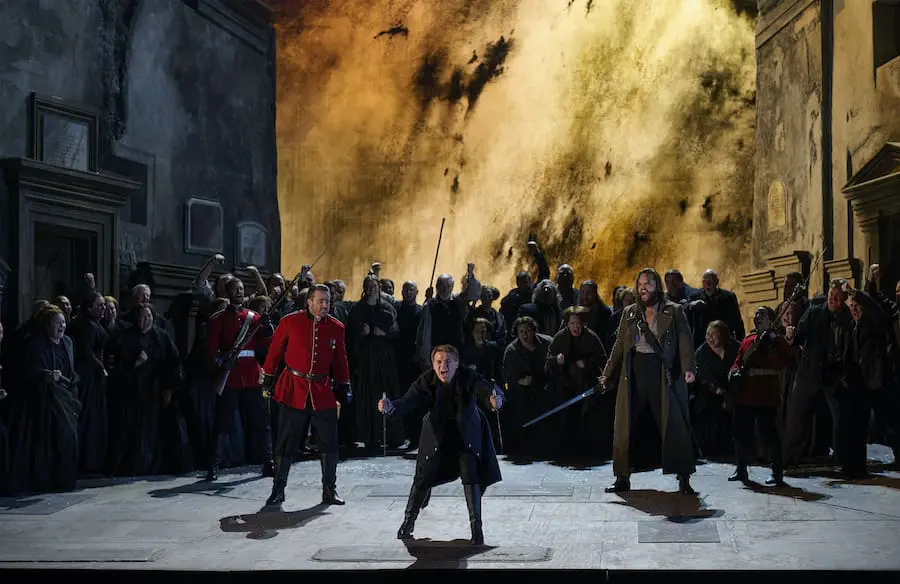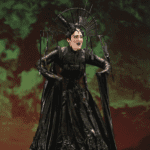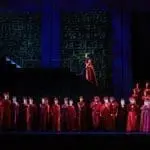Verdi’s Macbeth, which opened the Canadian Opera Company’s spring season April 28, is a challenging piece. It premiered in Florence in 1847 but was then revised for Paris in 1865 with significant cuts and additions. It’s mainly the later version we see today, which requires singers who can handle the musical mash of bel canto-era style and conventions with the more dramatic, free-flowing forms of Verdi’s later operas. It’s ever important, though, to remember his intentions in the earlier version. Macbeth was Verdi’s first conscious and concerted attempt to fuse music and drama; he led his singers in Florence through a rigorous rehearsal period right up to opening night, and constantly admonished them to “serve the poet better than they serve the composer.” The subject matter, with its heavy reliance on the supernatural world of the witches, the stark realpolitik of the ambitious Macbeths and the absence of any love interest unsettled the opera’s first audiences. But Verdi intended the shock of the new. As his librettist, Francesco Piave, wrote to the impresario in Florence, “the role of [Lady Macbeth] in particular will be the most sublime ever to have appeared on the operatic stage in Italy, and so will that of the baritone. I think that, if this opera is a success, it will give our music new tendencies and open up new paths for composers present and future.” Verdi urged Piave on: “This tragedy is one of the greatest creations of man! If we can’t do something great with it, let us at least try to do something out of the ordinary.”
Wednesday, May 17, 2023 at 6pm
Women’s Art Association, Toronto, ON
An Event To Support Opera Canada
TICKETS HERE
The enthusiastic response to opening night of the COC’s new Macbeth—a co-production with Lyric Opera of Chicago—was testament that it has handily faced the opera’s challenges head on with a cast that vividly projected the multifaceted layers of Verdi’s music in an intense staging that plays along the line between psychological thriller and horror story. The ruined church of designer John Macfarlane’s claustrophobic unit set, darkly and dramatically lit by David Finn, serves well for both the witches’ “blasted heath” and Macbeth’s dour fortresses, while Moritz Junge’s costuming gives the story a more contemporary veneer. The setting and updated visual look are offbeat, but the closed environment helps focus the action and the characters. Director Sir David McVicar is expert at helping his casts drill down to details in their portrayals, and better than most directors at individuating the big crowd scenes. His introduction of three very creepy child witches to haunt the Macbeths throughout the action is an especially effective intervention, upping the supernatural ante and helping limn the course of the Macbeths’ descent into madness.
When it premiered in Chicago in 2021, McVicar’s production marked the debut of Sondra Radvanovsky as Lady Macbeth. She pulled out of the Toronto staging not long before start of rehearsals, but the COC found an able replacement in Bulgarian soprano Alexandrina Pendatchanska, returning to the company after singing Elisabetta in Donizetti’s Maria Stuarda in 2010. At this stage of her career, her experience encompasses the demands of both the earlier and later Verdi. She can still articulate the more florid lines, and while the very top of the voice sounds a bit effortful, the ease and tonal palette of the middle and lower range i perfect to project the Lady’s malicious resolve. (“I would like the Lady’s voice to have a diabolical quality,” Verdi wrote in objection to casting a singer whose fine voice he regarded as having an “angelic quality”.) Pendatchanska’s account of “La luce luna,” the Act II aria added in the Paris version for just after the Macbeths’ plot to murder Banquo, together with the famed Sleepwalking Scene of Act IV (from the original Florence score) were highlights of her performance and demonstrated the range of this accomplished singer-actress. The Toronto staging marks a welcome return to the company of American baritone Quinn Kelsey to make his debut in the title role. If you’ve seen his previous appearances with the COC as Rigoletto and the Elder Germont, you’ll likely suspect that in neither physical nor vocal stature can his Macbeth be the hesitant, guilt-ridden weaker half of the murderous couple. And so his debut performance proves. Authoritatively and suavely sung, Kelsey’s explosive Macbeth is the weaker half because his unstable nature is on an emotional roller-coaster whose course seems unpredictable from the outset; by contrast, Lady’s Macbeth’s ambition is fuelled by a steelier, almost clinical resolve. She has a calming effect on him, beautifully etched in the great duet after Duncan’s murder and after his hallucinations in the Act II banqueting scene. For all the explosive outbursts, though, Kelsey’s Macbeth still manages, in the final act after the death of Lady Macbeth, to summon a sense of a nobler nature’s tragic decline and fall.
Verdi believed the important roles in this opera are Macbeth, Lady Macbeth and the chorus of Witches. All the other characters he dubbed incidental though that did not stop him from writing substantial numbers for them. Turkish bass Önay Köse, most recently at the COC as Timur in its 2019 Turandot, was an effective foil to Kelsey’s Macbeth in their suspicious interaction after the Witches’ prophecy and moving in his farewell aria to his son just before his own assassination. Tenor Adam Luther, a graduate of the COC Ensemble Studio, was back onstage as Malcolm and made a mark in his brief appearances, especially in the short rousing duet with tenor Matthew Cairns’s Macduff as they rouse their forces against Macbeth. As for Cairns, also an Ensemble Studio graduate and now with the Metropolitan Opera’s Lindemann Young Artist Development Program, he triggered a lengthy outburst from the audience for his delivery of Macduff’s single aria on learning of the murder of his family. The accolade was deserved; Cairns shows promise of being on a trajectory that could reach the orbit of star Canadian Verdi tenors like Mauro, Margison and Heppner.
Both COC Chorus and Orchestra are in top form for this musically exciting work. The chorus members—variously as witches, assassins and oppressed Scots—seem to relish the choreography, gesture and movement McVicar gives them to animate otherwise static mass vocal numbers; the precision and musicality of the whole, though, are always evident and notably help turn the great Ensemble Finales of Acts 1 and 2 into stunning vocal set pieces. The COC Orchestra is a world-class band that seems to take any score readily in stride. Here it responds with great panache to the direction of Italian conductor Speranza Scappucci. Returning to the company after a 2020 debut in which she led a remarkably fresh account of Rossini’s Il barbiere di Siviglia, she leads everyone in a taut, dramatically paced, melodically pointed reading of a fine work one commentator describes as “not the first Italian opera on a Shakespearean theme, but the first attempt to write a Shakespearean opera.”
Performances of the Canadian Opera Company’s Macbeth continue to May 20 (with Ukrainian soprano Liudmyla Monastyrska scheduled to sing Lady Macbeth in the final three performances).
Related Content ⬇
Opera Canada depends on the generous contributions of its supporters to bring readers outstanding, in-depth coverage of opera in Canada and beyond. Please consider subscribing or donating today.
CANADIAN OPERA COMPANY
APRIL 22 to 28
VERDI MACBETH
CAST AND CREATIVE
Conductor Speranza Scappucci
Assistant Conductor Derek Bate
Director Sir David McVicar
Assistant Director Andrew Adridge
Set Designer John Macfarlane
Costume Designer Moritz Junge
Associate Costume Designer Isaac B. Turner
Lighting Designer David Finn
Choreographer Andrew George
Revival Choreographer Julia Aplin
Fight Director Nick Sandys
Intimacy Director Siobhan Richardson
Price Family Chorus Master Sandra Horst
Stage Manager Jenifer Kowal
Surtitles Writer and Producer John Sharpe
Macbeth Quinn Kelsey
Lady Macbeth Alexandrina Pendatchanska
Banquo Önay Köse
Macduff Matthew Cairns
Malcolm Adam Luther
Lady-in-waiting Tracy Cantin
Servant Alex Halliday
A Doctor Vartan Gabrielian
Murderer Clarence Frazer
Fleance Roland Piers
First Apparition Giles Tomkinsv
Second Apparition Charlotte Siegel
Third Apparition Midori Marsh
With the COC Orchestra and Chorus
















